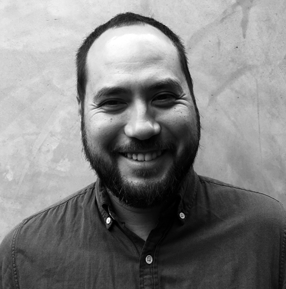One for tree, two for woods,
I-Goo wrote the characters
![]()
![]()
out for me. Dehiscent & reminiscent:
what wood made
Ng Ng’s hope-chest
that she immigrated with
—cargo from Guangzho
to Phoenix? In Spanish, Nana tells me
hope & waiting are one word.
_____
In her own hand, she keeps
a list of dichos—for your poems, she says.
Estan mas cerca los dientes
que los parentes, she recites her mother
& mother’s mother. It rhymes, she says.
Dee-say—the verb with its sound turned
down looks like dice
to throw & dice, to cut. Shift after shift,
she inspected the die of integrated circuits
beneath an assembly line of microscopes—
the connections over time
getting smaller & smaller.
_____
To enter words in order to see
—Cecilia Vicuña
In the classroom, we learn iambic words
that leaf on the board with diacritics—
about, aloft, aggrieved. What over years
accrues within one’s words? What immanent
sprung with what rhythm?
Agave—a lie in the lion, the maenad made mad
by Dionysus awoke to find her son
dead by her hand. The figure is gaslit
even if anachronistic. Data & river banks—
memory’s figure is often riparian. I hear Llorona’s agony
echo in the succulent. What’s the circuit in cerca to short
or rewire the far & close—to map
Ng Ng & I-Goo to Nana’s carpool?
______
I read a sprig of evergreen, a symbol
of everlasting, is sometimes packed
with a new bride’s trousseau. It was thirteen years
before Yeh Yeh could bring
Ng Ng & I-Goo over. Evergreen
& Empire were names of corner-stores
where they first worked—
stores on corners of Nana’s barrio.
Chinito, Chinito! Toca la malaca—
she might have sung in ’49
after hearing Don Tosti’s
recording—an l where the r would be
in the Spanish rattle filled with beans or seed or as
the song suggests
change in the laundryman’s till.
______
I have read diviners
use stems of yarrow when consulting
the I-Ching.
What happens to the woods in a maiden name?
Two hyphens make a dash—
the long signal in the binary code.
Attentive antennae: a monocot
—seed to single leaf—the agave store years
for the stalk. My two grandmothers:
one’s name keeps a pasture,
the other a forest. If they spoke to one another,
it was with short, forced words
like first strokes when sawing—
trying to set the teeth into the grain.
Copyright © 2019 by Brandon Som. Originally published in Poem-a-Day on September 26, 2019, by the Academy of American Poets.
“In 1948, my paternal grandmother Ann Lum Shee Som with her thirteen-year-old daughter—my I-Goo—immigrated to the U.S. where they joined my Yeh Yeh and worked in corner-stores in the barrios of Phoenix, Arizona. My maternal grandmother Pastora Mendoza was sixteen that year and living in one of those barrios called El Campito. As an adult, she worked for thirty years on the assembly line at Motorola. Like my nana’s work inspecting the semiconductors of some of the first cell phones, I’m hoping my poems can wire and rewire dialogue and understanding across languages and across borders.”
—Brandon Som

